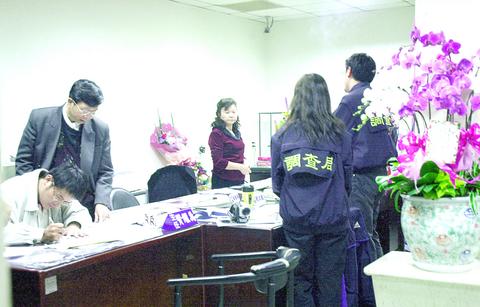Officials of the Kaohsiung District Prosecutors' Office yesterday raided 40 different locations yesterday searching for evidence of vote-buying in the election of Kaohsiung City Council Speaker Chu An-hsiung (朱安雄).
During the searches some NT$2 million in cash was found in the residence of DPP council caucus whip Jan Yung-lung (

PHOTO: CHANG CHUNG-YI, TAIPEI TIMES
Jan denied last night that the money found at his residence had any connection with vote buying.
Fourteen prosecutors and more than one hundred officials from the prosecutors' office searched Chu's residence, his An Feng Metal Company (
Written notes believed to contain details of the vote-buying were found in Chu's residence, while the accounts of An Feng were seized for examination in yesterday's search.
Chu, an independent city councilor, was elected as the council's speaker Wednesday with 25 votes from KMT, PFP, and independent councilors. He, however, has been suspected of buying votes for his speakership campaign.
The search was launched at 5:30pm yesterday, after Chu held a press conference stressing his innocence and that of the 25 councilors who voted for him.
Chu, however, made no comment on the result of the searches last night.
Political parties, including the DPP and KMT, both expressed their support for the investigation and appealed to their party members to cooperate with prosecutors.
Earlier yesterday, Chu demanded evidence from those politicians who had accused him of involvement in vote-buying for the speakership election and denounced his background of black-gold in a press conference.
"I am sorry for the 25 councilors who voted for me. They are innocent. Those people who accused me of vote-buying should prove it," Chu said.
"I am not a member of any [criminal] gang. How can they denounce me as a black-gold operator?" he said.
In yesterday's conference, Chu said that he was elected because of the irreconcilable conflicts between the political parties.
"High-ranking party officials living in Taipei [without knowing anything of the local society], are unsatisfied with the election result. They blame everything but themselves, despite this [his election as an independent] being the best result of this election," he said, reacting to the KMT and PFP's attempt to unseat him.
Political commentators yesterday said that Chu's election and the vote-buying allegations were just another example of local councils' vote-buying culture.
"This has been a tradition for the councilors. They need to get back the money they spent on their election campaigns from the speakership election," said Chen Li-kan (
"That's why politicians like the KMT's James Chen (
Chen was the director of the KMT's Organizational Affairs Department. He resigned on Thursday to take responsibility for the speakership election fiasco.
The speaker's position can be a lucrative one because the speaker automatically becomes a member of the city's Urban Planning Commission, a small body which administers city zoning. Huge sums of money can be made by rezoning farmland for commercial use.
Also see stories:
KMT seeks revision to oust Chu
Chu An-hsiung to face hearing in early January
Investigators find lavish bribery tab

MAKING WAVES: China’s maritime militia could become a nontraditional threat in war, clogging up shipping lanes to prevent US or Japanese intervention, a report said About 1,900 Chinese ships flying flags of convenience and fishing vessels that participated in China’s military exercises around Taiwan last month and in January last year have been listed for monitoring, Coast Guard Administration (CGA) Deputy Director-General Hsieh Ching-chin (謝慶欽) said yesterday. Following amendments to the Commercial Port Act (商港法) and the Law of Ships (船舶法) last month, the CGA can designate possible berthing areas or deny ports of call for vessels suspected of loitering around areas where undersea cables can be accessed, Oceans Affairs Council Minister Kuan Bi-ling (管碧玲) said. The list of suspected ships, originally 300, had risen to about

DAREDEVIL: Honnold said it had always been a dream of his to climb Taipei 101, while a Netflix producer said the skyscraper was ‘a real icon of this country’ US climber Alex Honnold yesterday took on Taiwan’s tallest building, becoming the first person to scale Taipei 101 without a rope, harness or safety net. Hundreds of spectators gathered at the base of the 101-story skyscraper to watch Honnold, 40, embark on his daredevil feat, which was also broadcast live on Netflix. Dressed in a red T-shirt and yellow custom-made climbing shoes, Honnold swiftly moved up the southeast face of the glass and steel building. At one point, he stepped onto a platform midway up to wave down at fans and onlookers who were taking photos. People watching from inside

Japan’s strategic alliance with the US would collapse if Tokyo were to turn away from a conflict in Taiwan, Japanese Prime Minister Sanae Takaichi said yesterday, but distanced herself from previous comments that suggested a possible military response in such an event. Takaichi expressed her latest views on a nationally broadcast TV program late on Monday, where an opposition party leader criticized her for igniting tensions with China with the earlier remarks. Ties between Japan and China have sunk to the worst level in years after Takaichi said in November that a hypothetical Chinese attack on Taiwan could bring about a Japanese

STREAMLINED: The dedicated funding would allow the US to transfer equipment to Taiwan when needed and order upgraded replacements for stockpiles, a source said The US House of Representatives on Thursday passed a defense appropriations bill totaling US$838.7 billion, of which US$1 billion is to be allocated to reinforcing security cooperation with Taiwan and US$150 million to replace defense articles provided to the nation. These are part of the Consolidated Appropriation Act, which the US House yesterday passed with 341 votes in favor and 88 against. The act must be passed by the US Senate before Friday next week to avoid another government shutdown. The US House Committee on Appropriations on Monday unveiled the act, saying that it allocates US$1 billion for the Taiwan Security Cooperation Initiative